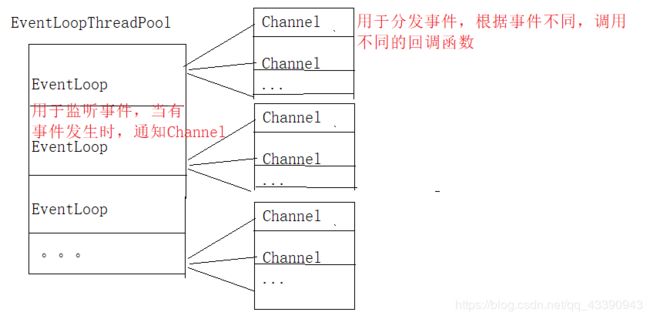muduo 源码分析 EventLoop 类
文章目录
- 构造与析构
- loop 监听所有的文件描述符
- quit 退出监听状态
- 执行监听套接字以外的任务
- 关于定时器的函数
- 更新一个Channel和删除一个Channel
- wakeup 唤醒正在监听的线程
EventLoop 用于监听文件描述符上的事件,EventLoop不进行事件的分发,只通知相应的事件分发器有事件产生,有相应的事件分发器进行分发。
对于一个服务器来说,可能有多个EventLoop进行事件的监听,但是一个线程只有一个EventLoop。当一个新的文件描述符产生的时候,哪个EventLoop进行监听,有一定的算法进行分配,在EventLoopThreadPool类中有说明。

EventLoopThreadPool用于管理所有的EventLoop。
构造与析构
EventLoop::EventLoop()
: looping_(false),
quit_(false),
//正在处理事件
eventHandling_(false),
callingPendingFunctors_(false),
iteration_(0),
//返回当前线程的ID
threadId_(CurrentThread::tid()),
poller_(Poller::newDefaultPoller(this)),
//定时器
timerQueue_(new TimerQueue(this)),
//eventfd 用于线程间的唤醒通知,
wakeupFd_(createEventfd()),
//创建一个Channel 分发eventfd文件描述符上产生的事件
wakeupChannel_(new Channel(this, wakeupFd_)),
currentActiveChannel_(NULL)
{
LOG_DEBUG << "EventLoop created " << this << " in thread " << threadId_;
if (t_loopInThisThread)
{
LOG_FATAL << "Another EventLoop " << t_loopInThisThread
<< " exists in this thread " << threadId_;
}
else
{
t_loopInThisThread = this;
}
//设置回调函数
wakeupChannel_->setReadCallback(
std::bind(&EventLoop::handleRead, this));
// we are always reading the wakeupfd
//设置当前的Channel 的读事件,并加入到EventLoop 循环中
//每个EventLoop 监听
wakeupChannel_->enableReading();
}
//析构函数
EventLoop::~EventLoop()
{
LOG_DEBUG << "EventLoop " << this << " of thread " << threadId_
<< " destructs in thread " << CurrentThread::tid();
//移除所有监听的Channel
wakeupChannel_->disableAll();
wakeupChannel_->remove();
//wakeupFd_时EventLoop 所在的线程单独管理的文件描述符,
//所以在这单独关闭
::close(wakeupFd_);
t_loopInThisThread = NULL;
}
loop 监听所有的文件描述符
void EventLoop::loop()
{
assert(!looping_);
assertInLoopThread();
looping_ = true;
quit_ = false; // FIXME: what if someone calls quit() before loop() ?
LOG_TRACE << "EventLoop " << this << " start looping";
//如果没有人调用quit() 函数, 下面将进入循环处理就绪的事件
while (!quit_)
{
//原来的就绪的事件先清空
activeChannels_.clear();
//调用poll 函数开始监听所有的套接字
//当有就绪事件产生的时候返回就是事件发生的事件,并且将所有有就绪事件的Channel 放到
//activeChannels_中
pollReturnTime_ = poller_->poll(kPollTimeMs, &activeChannels_);
++iteration_;
//记录日志
if (Logger::logLevel() <= Logger::TRACE)
{
printActiveChannels();
}
// TODO sort channel by priority
//之间正在处理的状态置为true
eventHandling_ = true;
//poller 中的fillActiveChannel 将就绪的事件已经添加到了
//activeChannels_中
//处理就绪的事件
for (Channel* channel : activeChannels_)
{
currentActiveChannel_ = channel;//
currentActiveChannel_->handleEvent(pollReturnTime_);
}
currentActiveChannel_ = NULL;
eventHandling_ = false;
//执行pendingFunctors_队列中的函数,当前线程要执行的任务的集合
doPendingFunctors();
}
LOG_TRACE << "EventLoop " << this << " stop looping";
looping_ = false;
}
quit 退出监听状态
void EventLoop::quit()
{
//将退出的状态置为true
quit_ = true;
// There is a chance that loop() just executes while(!quit_) and exits,
// then EventLoop destructs, then we are accessing an invalid object.
// Can be fixed using mutex_ in both places.
//如果一直没有事件发生,此时EventLoop 处于poll 的等待状态,则线程无法正常退出
//wakeup 向wakeFd_写入数据,此时唤醒了线程,可以正常退出
if (!isInLoopThread())
{
wakeup();
}
}
执行监听套接字以外的任务
例如:添加一个文件描述符,删除一个文件描述符等。
void EventLoop::runInLoop(Functor cb)
{
//当前线程是不是EventLoop 所在的线程
if (isInLoopThread())
{
cb();
}
//处于poll 的等待状态,则将当前事件放入pendingFunctors_队列中
else
{
queueInLoop(std::move(cb));
}
}
void EventLoop::queueInLoop(Functor cb)
{
{
MutexLockGuard lock(mutex_);
pendingFunctors_.push_back(std::move(cb));
}
if (!isInLoopThread() || callingPendingFunctors_)
{
wakeup();
}
}
void EventLoop::doPendingFunctors()
{
std::vector<Functor> functors;
callingPendingFunctors_ = true;
{
MutexLockGuard lock(mutex_);
functors.swap(pendingFunctors_);
}
//执行当前线程要执行的任务
for (const Functor& functor : functors)
{
functor();
}
callingPendingFunctors_ = false;
}
关于定时器的函数
//添加一个定时器对象在time 时刻触发一次,调用cd 回调函数
TimerId EventLoop::runAt(Timestamp time, TimerCallback cb)
{
return timerQueue_->addTimer(std::move(cb), time, 0.0);
}
TimerId EventLoop::runAfter(double delay, TimerCallback cb)
{
Timestamp time(addTime(Timestamp::now(), delay));
return runAt(time, std::move(cb));
}
//添加一个定时器对象在time 触发,调用cd 回调函数,之后隔一段事件触发一次
TimerId EventLoop::runEvery(double interval, TimerCallback cb)
{
Timestamp time(addTime(Timestamp::now(), interval));
return timerQueue_->addTimer(std::move(cb), time, interval);
}
//取消一个定时器
void EventLoop::cancel(TimerId timerId)
{
return timerQueue_->cancel(timerId);
}
更新一个Channel和删除一个Channel
void EventLoop::updateChannel(Channel* channel)
{
assert(channel->ownerLoop() == this);
assertInLoopThread();
//调用Poller的updateChannel函数
poller_->updateChannel(channel);
}
void EventLoop::removeChannel(Channel* channel)
{
assert(channel->ownerLoop() == this);
assertInLoopThread();
if (eventHandling_)
{
assert(currentActiveChannel_ == channel ||
std::find(activeChannels_.begin(), activeChannels_.end(), channel) == activeChannels_.end());
}
poller_->removeChannel(channel);
}
wakeup 唤醒正在监听的线程
void EventLoop::wakeup()
{
uint64_t one = 1;
//用于唤醒一个线程
ssize_t n = sockets::write(wakeupFd_, &one, sizeof one);
if (n != sizeof one)
{
LOG_ERROR << "EventLoop::wakeup() writes " << n << " bytes instead of 8";
}
}
//唤醒线程后执行的read 函数
void EventLoop::handleRead()
{
uint64_t one = 1;
ssize_t n = sockets::read(wakeupFd_, &one, sizeof one);
if (n != sizeof one)
{
LOG_ERROR << "EventLoop::handleRead() reads " << n << " bytes instead of 8";
}
}